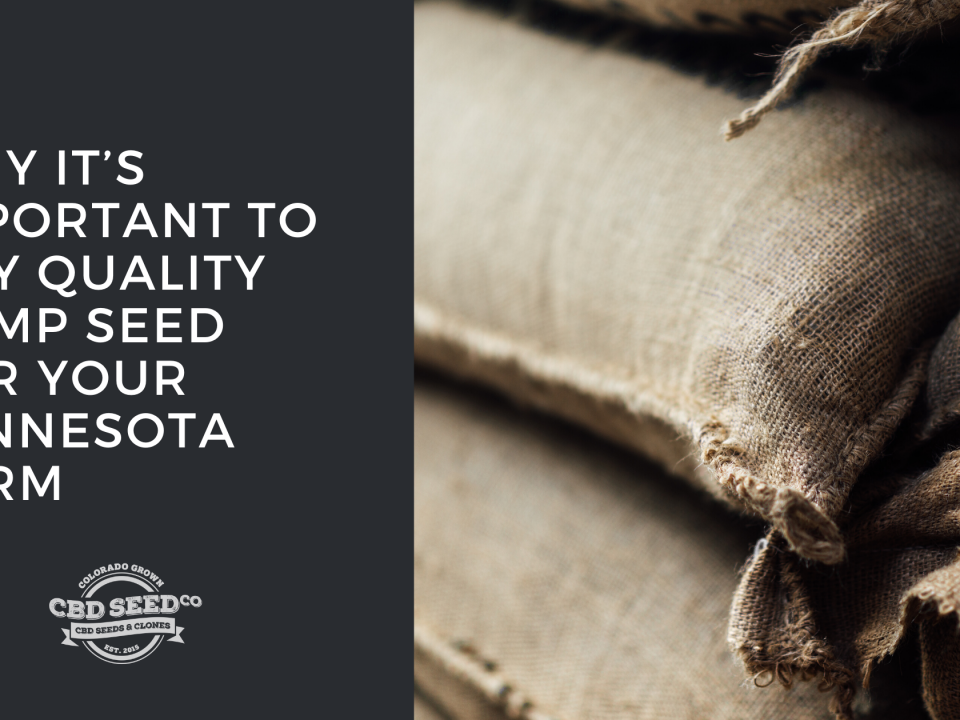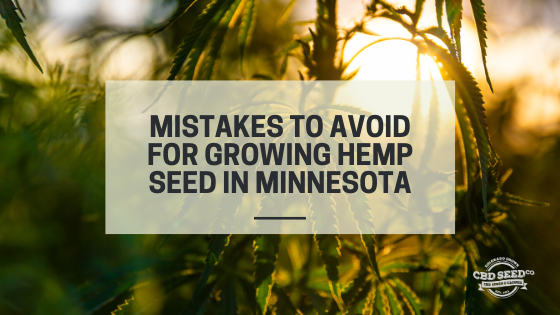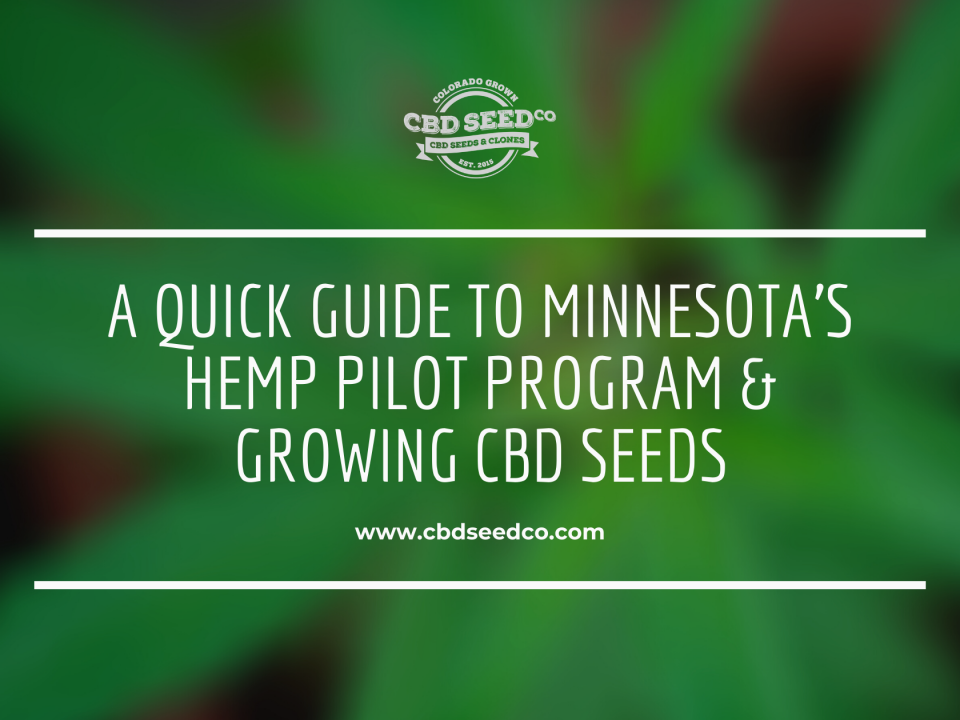[vc_row][vc_column][vc_custom_heading text=”What You Need to Know About Growing Hemp Seeds in Minnesota” font_container=”tag:h2|text_align:left|color:%23a47c3b” use_theme_fonts=”yes” el_class=”hide-desktop”][vc_single_image image=”2730″ img_size=”full” alignment=”center” el_class=”hide-mobile”][vc_column_text]The hemp farming industry can be extremely lucrative if you come well prepared. Unlike other agricultural crops, hemp is highly regulated and has its own set of challenges. While hemp can be a low-maintenance crop, it does have specific cultivation requirements. Are you thinking of getting into CBD/industrial hemp farming in Minnesota? Here are some of the things you need to know.
- CBD oil and other CBD products are hot and that market is growing in leaps and bounds… so if you grow your hemp crop specifically to sell for CBD, you’ll make the most money on it.
- However, this requires purchasing seeds genetically proven to grow plants with optimal amounts of CBD.
- It’s true that a higher CBD content is better, but when it comes to the THC content, it’s required to be no more than 0.3% per dry weight per USDA regulations. And your crop will need to be tested to ensure those levels. Anything higher than 0.3%, your crop might be declared “contraband.”
- At that point, the Minnesota Department of Agriculture might make the determination that the crop must be destroyed (under supervision of law enforcement officials).
- To avoid this mishap, which will be frustrating, disappointing, and extremely costly, get as much education as possible on how to successfully grow a CBD crop in Minnesota. Learn as much as possible before the first seed or clone hits the dirt!
- Another important recommendation is to find a buyer for your crop before planting and harvesting. You don’t want to wind up with a fantastic harvest and no one to sell it to!
Where to Get Licensed to Grow CBD In Minnesota
In order to grow hemp commercially, you’ll need to apply for licensing first. You can obtain your hemp growing license from the Minnesota Hemp Program. All licensing information can be found on its website with resources for regulations and everything else you’ll need to know before you get started.[/vc_column_text][vc_empty_space height=”8px”][/vc_column][/vc_row][vc_row][vc_column width=”2/3″][vc_column_text]
Minnesota Regulations for Growing CBD Clones & Seeds
Educate yourself about regulations and best practices for growing a successful CBD crop, with the following two websites as your starting point:
Minnesota Department of Agriculture: This is where you’ll learn about the specific regulations for the growing of industrial hemp in the State of Minnesota. You’ll be able to find the licensing regulations, the testing requirements, and much more. If you have any questions, you can reach the program via email at hemp.mda@state.mn.us or by phone at 651-201-6600.
Some of the information found on the MDA includes:
- 2021 Hemp Grower Application: When you’re ready to apply for hemp farming licensing, you’ll need to submit your application through the online portal.
- Information for first-time growers and processors: This is a great resource to learn more about the regulations locally and federally. If this is your first year growing hemp, you’ll want to start here.
- Information for returning growers and processors: For returning growers, you’ll want to read through this document to learn more about the renewal process.
- Minnesota Hemp Farming FAQ: This is another helpful resource for finding out more information regarding local requirements and general hemp cultivation.
- Sign up for email notifications about the MDA’s Industrial Hemp Program.
United States Department of Agriculture (USDA): This website is easy to read and chock full of useful information, not just about federal regulations but also about the growing, testing, processing of industrial hemp and CBD seeds and clones. The USDA is big on education and offers a lot of free resources, including these articles:
- Overview
- Information for Producers
- Information for Sampling Agents
- Information for Laboratory Testing
- Hemp Analytical Testing Laboratories
- Frequently Asked Questions
- Rulemaking Documents
Sign up for the USDA’s email update list to be informed of any changes in the Hemp Program regulations.[/vc_column_text][/vc_column][vc_column width=”1/3″][vc_single_image image=”2731″ img_size=”300×400″ alignment=”center” css_animation=”fadeInRight” el_class=”hide-mobile”][/vc_column][/vc_row][vc_row][vc_column width=”1/3″][vc_single_image image=”2732″ img_size=”300×400″ alignment=”center” css_animation=”fadeInLeft”][/vc_column][vc_column width=”2/3″][vc_column_text]
Minnesota’s Hemp Biomass Transportation Regulations
Minnesota does not have any regulations in place regarding transporting hemp. However, it’s always highly recommended to bring your hemp biomass’s corresponding COA showcasing legal THC content as well as your hemp grower’s license during transportation. Having these pieces of paperwork with you will help alleviate any issues if you run into law enforcement.[/vc_column_text][/vc_column][/vc_row][vc_row][vc_column width=”2/3″][vc_column_text]
Regions of Minnesota Where CBD Is Grown
Minnesota has an abundance of fertile farmland that’s as good for farming hemp as it is for their main agricultural products, grain corn, dairy, and sweet corn.
Hemp is now being farmed in many areas across the state, including the following counties:
- Carver County
- Renville County
- Hennepin County
- Aitkin County
- Ramsey County
- Louis County
- Cass County
- Dakota County
- Houston County
- Lyon and Redwood County
- Blue Earth County
- Freeborn County
- Sherburne County
- Wabasha County
- Otter Tail County
- Pine County
- Wright County
- Anoka County
- Lac Qui Parle County
- And more…
[/vc_column_text][/vc_column][vc_column width=”1/3″][vc_single_image image=”5652″ img_size=”300×400″ alignment=”center” css_animation=”fadeInRight” el_class=”hide-mobile”][/vc_column][/vc_row][vc_row][vc_column width=”1/3″][vc_single_image image=”5650″ img_size=”300×400″ alignment=”center” css_animation=”fadeInLeft”][/vc_column][vc_column width=”2/3″][vc_column_text]
Minnesota Agricultural Regions for Cultivating CBD Hemp
Minnesota has many agricultural regions that are great for farming hemp commercially:
- Arrowhead
- Dairy Belt
- Corn Belt
- Red River Valley
When you’re ready to purchase your CBD seed, always speak to your provider regarding what agricultural region you’re in. This is important so that you get the right strains for your climate and topography.[/vc_column_text][/vc_column][/vc_row][vc_row][vc_column width=”2/3″][vc_column_text]
Minnesota Hemp & CBD Seed News
When it comes to hemp farming, it’s important to stay up to date with local industry news. Since regulations and the local hemp market vary from state to state, you’ll want to do your own research to make sure you stay informed and compliant. A great tool for this is Google Alerts. You can receive free daily or weekly alerts with your preferred search terms. Try looking for news articles with terms like “hemp farming Minnesota” or “CBD market Minnesota”.
Feb 17, 2020: Hemp rules give Minnesota farmers little room for error with law enforcement.
This article in the Star Tribune is a must read!
It details one farmers struggle with raising a CBD crop with THC in the legal limit, and what happened when he failed.
Jan. 21, 2020: Minnesota hemp industry going strong, but 2020 a critical year for the future.
This article on WCCORadio.com explains that, “One year after federal Farm Bill, lessons learned combine with optimism.”
Dec. 4, 2019: What’s the future of industrial hemp in Minnesota? More growth
Nov. 26, 2019: CBD, hemp businesses blaze through campus.
This article in the Minnesota Daily talks about the boom in hemp growing and hemp related businesses since hemp was legalized.[/vc_column_text][/vc_column][vc_column width=”1/3″][vc_single_image image=”5651″ img_size=”300×400″ alignment=”center” css_animation=”fadeInRight” el_class=”hide-mobile”][/vc_column][/vc_row][vc_row][vc_column width=”1/3″][vc_single_image image=”2734″ img_size=”300×400″ alignment=”center” css_animation=”fadeInLeft”][/vc_column][vc_column width=”2/3″][vc_column_text]
CBD & Hemp Resources for Minnesota Farmers
Learn more about all the different local and federal resources available for hemp farmers on cultivation, CBD regulations, and more. It’s always a good idea for beginner hemp farmers to find a few organizations to join to help network and find the support they need for potential buyers.
Minnesota-Based Hemp Organizations
- Minnesota Hemp Association: According to their website, “The Minnesota Hemp Association is a 501(c)(4) organization providing advocacy, education, and business development opportunities to advance the growth and vitality of Minnesota’s hemp industries from seed to sale. We provide our network … with vital industry news, valuable business-to-business opportunities, and influence to shape regulatory and public policy decisions.”
- Minnesota Industrial Hemp Association: According to their website, their mission is “to implement a multifaceted approach to monitor the legislative and regulatory issues related to the industrial hemp and CBD industries and prevent, at the local, state and federal levels, harmful actions such as large tax increases on the sales of products, CBD marketing restrictions and retail sales restrictions.”
National Hemp Resources
- Hempstead Project Heart: Hempstead is an educational, environmental, and economic advocate for industrial hemp. This organization strives to raise awareness of industrial hemp for tribes and local communities. By focusing on raising awareness on the benefits of hemp, Hempstead hopes to help redevelop successful hemp economies and connecting tribal, urban, and rural communities. Farmers can find more general information regarding hemp if they’re interested in learning more about the industry and finished product opportunities.
- National Hemp Association: Membership is available for entrepreneurs, farmers, professors, researchers, manufacturers, investors, organizations, and businesses involved in the hemp industry. This is an excellent resource for beginner farmers and experienced farmers alike looking to joining an extensive network. Since this association serves farmers, processors, businesses, manufacturers, and researchers, you can connect with different individuals from various sectors of the industry. While local organizations are always important, having a national network can help you expand your business and find potential biomass buyers. From member directories to state-specific resources, this is a wonderful starting point.
- Hemp Industries Association: Hemp Industries Association has worked as a hemp advocacy group for almost 30 years. The organization has fought to legalize and establish hemp as a federal commodity through legal action, advocacy, and education. They offer a great trade association for hemp farmers with reasonable membership pricing. Membership benefits include incredible networking benefits with other individuals in the industry as well as lawmakers. With significant educational resources and highly transparent access to other members, hemp farmers can create connections and find invaluable information.
- US Hemp Roundtable: This coalition of leading hemp companies and organizations is committed to safe hemp and CBD products. The US Hemp Roundtable works with political officials for passing legislation that supports both hemp farmers and consumers. This organization also provides education and advocacy to help create a viable path for safe, legal hemp-derived products. Gain access to complimentary state action, industry updates, and federal resources when you sign up for their newsletter.
- US Hemp Authority: Achieve better credibility, compliance, and more by getting certified through the US Hemp Authority. If you’re only interested in growing hemp then selling your biomass to a buyer or processor, this certification is not for you. This resource is for Minnesota farmers that plan on producing CBD in-house or would like to sell hemp-derived products. For farms interested in branding themselves and selling directly to consumers, having a US Hemp Authority certification can provide better trust for your customers. Since the CBD industry is currently unregulated, this certification provides assurances that your growing and manufacturing standards are high.
- US Hemp Growers Association: Gain access to hemp research and incredible resources that help farmers stay up to date on regulatory developments, certified CBD seed, and more. This farmer-specific national organization is great for connecting with other licensed growers and certified crop advisors. They offer a free six-month trial membership and have various membership levels to choose from. With comprehensive educational resources, this can be a great jumping-off point for novice hemp farmers. US Hemp Growers Association also provides extensive industry and regulatory resources in addition to events you can attend.
- American Trade Association for Cannabis and Hemp: The trade association is a great place for both marijuana and hemp industry professionals. Their mission is to professionalize industry representation. Unlike the other hemp-specific associations, this one provides support for both cannabis industries. This can provide a wonderful networking opportunity for fellow individuals in the hemp industry as well as the marijuana industry. By focusing on advocacy and education, ATACH hopes to make cannabis mainstream and provide professional industry representation.
[/vc_column_text][/vc_column][/vc_row][vc_row][vc_column width=”2/3″][vc_column_text]
Hemp Biomass Selling Tips for Minnesota Farmers
- Hire a hemp broker: There are licensed hemp brokers that can help you negotiate the best price for your hemp biomass. You’ll want to look for an experienced individual with many connections in the industry and a great track record.
- Presell your biomass: This is an ideal option since the window for selling your harvested biomass is short. Having a buyer lined up can help alleviate stress post-harvest while giving you the competitive advantage of growing specific strains that potential buyers are looking for.
- Sell directly to buyers: If you have the connections, it may be a good idea to cut out the middle man. Selling directly to buyers can help you maximize your profits but it will require more work.
- Profit-sharing agreements: For farmers interested in joining the hemp industry but don’t have the upfront finances, profit-sharing agreements may be a good option for you. Profit-sharing works by finding a buyer willing to pay for all upfront costs and recoups these expenses after harvest.
- Hemp future contracts: This type of agreement is signed before you start your season with a set price arranged for your biomass. While the price provided in future contracts is usually less than the price available with the open market, this is a good option for better stability and minimizing fluctuation risks.
- Networking: Joining a hemp association or attending a hemp trade show can offer networking opportunities for connecting with potential buyers. The more places you can find to network, the more opportunities you’ll find.
order!
[/vc_column_text][/vc_column][vc_column width=”1/3″][vc_single_image image=”5653″ img_size=”300×300″ alignment=”center” css_animation=”fadeInRight” el_class=”hide-mobile”][/vc_column][/vc_row][vc_row][vc_column width=”1/3″][vc_single_image image=”5654″ img_size=”300×400″ alignment=”center” css_animation=”fadeInLeft”][/vc_column][vc_column width=”2/3″][vc_column_text]
Minnesota Hemp Farming & CBD Seed FAQ
[/vc_column_text][vc_tta_accordion][vc_tta_section title=”When does my hemp growing license expire?” tab_id=”1614390521769-24075184-b41c”][vc_column_text]Hemp growing licenses are valid for one year and expire on December 31 of the year they are issued.[/vc_column_text][/vc_tta_section][vc_tta_section title=”What happens if I grow more than one hemp variety or harvest multiple times a year?” tab_id=”1614390521816-9474f301-373a”][vc_column_text]The MDA has to sample every lot of hemp prior to harvest. That means that the MDA will need to test every unique variety planted on your farm. They will also need to sample your crops prior to every harvest.[/vc_column_text][/vc_tta_section][vc_tta_section title=”Do I need to report my hemp acreage to the Farm Service Agency?” tab_id=”1614390895360-07d34500-ddbf”][vc_column_text]Yes, beginning January 1, 2021, all hemp growers will need to report their hemp acreage to their local FSA offices. This includes both indoor and outdoor hemp growing lots.[/vc_column_text][/vc_tta_section][vc_tta_section title=”Do I need to submit my information to the local police?” tab_id=”1614390975113-aef4622f-1a80″][vc_column_text]No, the MDA will report your field location and contact information to the sheriff as well as the regional drug task force. That’s why it’s crucial to provide accurate field location information during your application process.[/vc_column_text][/vc_tta_section][vc_tta_section title=”What kind of hemp seed do I need to buy?” tab_id=”1614391099720-044cb88e-3980″][vc_column_text]This depends on your finished product goals. If you intend of producing fiber, building materials, food, etc., you’ll need to buy industrial hemp seed. For CBD production, you’ll need to purchase high CBD seed.[/vc_column_text][/vc_tta_section][/vc_tta_accordion][/vc_column][/vc_row][vc_row][vc_column][vc_column_text]
Minnesota CBD Hemp Farming Resources
Learn more about local market updates, cultivation advice, and more for your hemp farm:[/vc_column_text]
Work With Minnesota’s Trusted CBD Seed Company
CBD Seed Co offers a variety of top-quality, genetically proven, high CBD seeds and clones. Please check out the rest of our website to read more about our products, our background, our commitment to quality, and our mission. Contact us today regarding your CBD seed needs![/vc_column_text][/vc_column][vc_column width=”1/3″][vc_single_image image=”2735″ img_size=”300×300″ alignment=”center” css_animation=”fadeInRight” el_class=”hide-mobile”][/vc_column][/vc_row]




